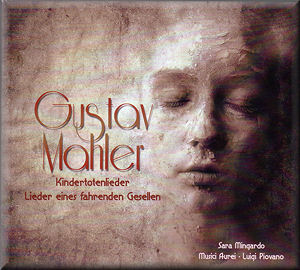 |
 |
|


alternatively
CD: MDT
AmazonUK
AmazonUS |
Gustav MAHLER (1860
- 1911)
Kindertotenlieder (Version for small orchestra by Reiner
Riehn)
1. Nun will die Sonn’ so hell aufgeh’n! [5:09]
2. Nun seh’ ich wohl, warum so dunk’le Flammen
[4:41]
3. Wenn dein Mütterlein [4:38]
4. Oft denk’ ich, sie sind nur ausgegangen [2:36]
5. In diesem Wetter [6:26]
6. Quartettsatz [11:05]
Lieder eines fahrenden Gesellen (version for small orchestra
by Arnold Schönberg)
7. Wenn mein Schatz Hochzeit macht [3:59]
8. Ging heut’ Morgen übers Feld [4:08]
9. Ich hab’ ein glühend Messer [3:24]
10. Die zwei blauen Augen [5:30]
Ferruccio BUSONI (1866 - 1924)
11. Berceuse élégiaque (version for small orchestra
by Erwin Stein) [10:38]
 Sara Mingardo (contralto) (1-5, 7-10)
Sara Mingardo (contralto) (1-5, 7-10)
Musici Aurei/Luigi Piovano
Grazia Raimondi (violin), Silvio Di Rocco (viola), Olaf Laneri (piano),
Luigi Piovano (cello) (Quartettsatz)
rec. Teatro Fedele Fenaroli di Lanciano, Italy, July 2011
Sung texts with French and English translations enclosed
 ELOQUENTIA EL 1233 [62:21]
ELOQUENTIA EL 1233 [62:21]
|
|
|
It seems that there is a vogue for recording Mahler songs in
reduced versions for chamber sized orchestra. Not long ago I
wrote at some length about the background to these reductions
when reviewing a disc with the Canadian singer Julie Boulianne
(see review).
Let me just briefly mention that it was Arnold Schönberg
who was the initiator, since a private music society in Vienna,
run by him and his associates, couldn’t afford hiring
a full-size orchestra and thus they arranged the music for the
instruments that were available. Schönberg himself made
the arrangement of Lieder eines fahrenden Gesellen, also
used on the Boulianne disc. It was written for flute, clarinet,
harmonium, piano, triangle, glockenspiel and string quintet.
The arrangement of Kindertotenlieder is however of later
date, made by Rainer Riehn in 1987 but employing the same forces.
Interestingly the Boulianne disc has the cycle in an arrangement
by Reinbert de Leeuw, made in 1991. de Leeuw is an authority
on Schönberg, being the founder and long-time director
of the Amsterdam Schönberg Ensemble. To complicate things
further the arrangement of Busoni’s Berceuse élégiaque
for the present issue is attributed to Erwin Stein, though on
de Leeuw’s recording, made some decades ago, it is by
Schönberg. To my ears they sound identical and probably
evidence has appeared that Schönberg was the promoter but
asked his pupil Stein to write it.
Someone may ask what this Busoni composition is doing on a Mahler
disc, but there is a simple explanation or rather two: One is
that it belongs to the group of works that Schönberg and
his friends wanted for their Music Society; the other is that
Mahler conducted the premiere of the work at Carnegie Hall with
the New York Philharmonic on 21 February 1911, his very last
concert. Less than three months later he was dead. Berceuse
élégiaque is a sombre piece, relatively static
and only briefly rising to a forte. The piece was written in
memory of his mother, who passed away on 3 October 1909. Busoni
based it on a berceuse for piano that he had written earlier
the same year. The composition was finished on 27 October but
it was another sixteen months before it was finally premiered
with the composer present, sharing the box with Arturo Toscanini,
who greatly admired the music and later played it several times.
Just as the Mahler songs do, the chamber version of this work
also makes it sound frailer and more vulnerable.
The Quartettsatz is the only work from Mahler’s
youth that has survived. It is also his only chamber music work,
written in 1876 when he was sixteen. It was played twice that
year with Mahler at the piano and after that forgotten, found
again in the early 1960s and published in 1964. It is dark and
often agitated, late romantic in style and I don’t think
anyone hearing it for the first time would associate it with
Mahler. He is said to have written other chamber music as well
but nothing of this has been preserved, so it’s good to
have this Quartettsatz.
Sara Mingardo’s dark and vibrant contralto is a pliant
instrument and makes one think of singers like Kathleen Ferrier
and Marilyn Horne, who also recorded this darkest of song-cycles.
Since they, like most other singers on records, use the full
orchestral version, they are no ideal comparisons. For that
I would instead pick Julie Boulianne, and she is simply gorgeous.
Hers is also a vibrant voice but it is slightly lighter in tone
and she is even more nuanced than Mingardo. The latter, however,
is particularly impressive in the inward reading of the last
songIn diesem Wetter. Boulianne’s more youthful
timbre suits the earlier cycle Lieder eines fahrenden Gesellen
even better but Mingardo is again at her most deeply probing
in the final song, Die zwei blauen Augen. Principally
speaking I prefer a baritone in this cycle but I have wonderful
female readings from the likes of Janet Baker and Frederica
von Stade.
Making a choice between versions for chamber orchestra is further
complicated due to the couplings. The instrumental music on
Mingardo’s disc is valuable, but so are the five songs
by Alma Mahler on Boulianne’s disc. I am happy to have
both but have a feeling that I will return to Julie Boulianne
more often - for the singing per se, but also for Alma’s
songs and for a recording that is marginally fuller and with
greater depth. As always with oft-recorded music it is almost
impossible to make a clear-cut decision. Suffice to say that
either of these two discs should satisfy those who are curious
to hear these alternative versions.
Göran Forsling

alternatively
CD: MDT
AmazonUK
AmazonUS
|
|

